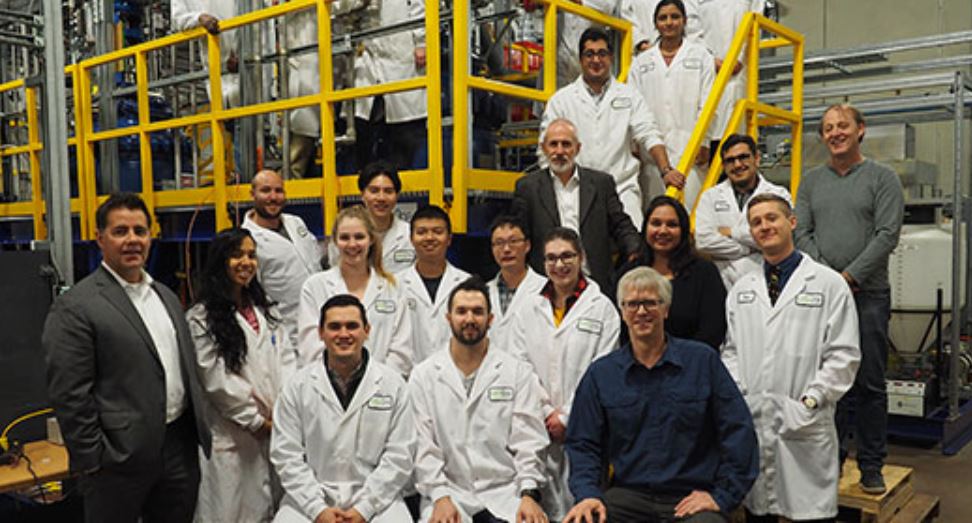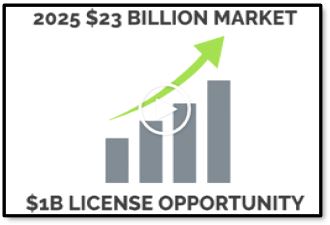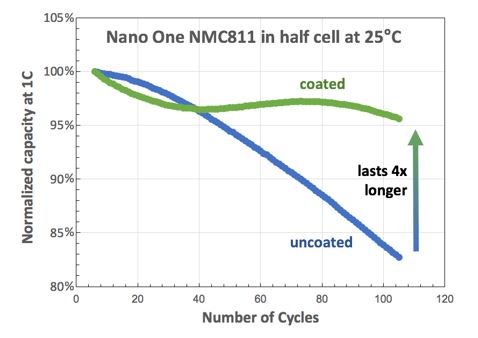Nano One Introduces a Breakthrough in Longer Lasting Lithium-Ion Cathode Materials

“Single Crystal” has become a bit of a buzz word for the lithium ion battery industry ever since Jeff Dahn Group (Tesla funded) published a paper last fall highlighting the fact that “single crystal” cathodes with novel electrolytes may result in a “million mile” battery. Currently they are expensive and difficult to make in the industry.
Nano One’s technology can make “single crystal” cathode materials with no additional costs and less steps resulting in the desired increase in durability. See short Nano One video for explanation: Link To Video

[TSX-V: NNO, OTC-Nasdaq Intl Designation: NNOMF, Frankfurt: LBMB]. Dr. Stephen Campbell, Chief Technology Officer of Nano One Materials Corp. is pleased to announce the development of a coated, single crystal cathode material for lithium ion batteries that is providing up to 4 times improvement in longevity. Furthermore, this technology is applicable to all of Nano One’s cathode materials but is especially relevant to lithium nickel manganese cobalt oxide (NMC811). These latest innovations are patent pending.

“Nano One has developed a coated single nanocrystal cathode material,” explained Dr. Campbell, “which provides protection against undesirable side reactions and the stresses of repeated charge and discharge cycling. We are focused on optimizing this for NMC811 and I am pleased to present recent results that show how protective coatings on a robust crystal structure can make cathode powders more durable and longer lasting. Increased durability is critical in enabling extended range, faster charging and even million mile batteries for electric vehicles.”
Conventional Versus Single Crystal Cathodes
Conventional cathodes consist of a dense cluster of crystalline particles (polycrystalline), made by first forming clusters of NMC precursor then milling with lithium and firing in a kiln. Protective coatings can then be formed by adding coating materials and firing again. However, the clusters expand, contract, and break apart from repeated charging, which fractures the outer coating and leaves individual crystals within the clusters exposed to deleterious side reactions.
These polycrystalline particles can be transformed into large single crystals (monocrystalline) by prolonging the firing time in the kiln. The resulting powders are less prone to cracking but excessive time in the kiln damages the lithium nickel structures, adds prohibitive process cost and requires additional steps to apply protective coatings.

In contrast, Nano One’s patented One-Pot process combines all input components – lithium, metals, additives and coatings – in a single reaction to produce a precursor that, when dried and fired, forms quickly into a single crystal cathode material simultaneously with its protective coating.
Dr. Campbell said “By forming protective coatings on individual nanocrystals, Nano One eliminates process steps and is engineering new materials with enhanced durability for various applications including electric vehicles. These are positive results and we are optimizing the materials for third party evaluation on the path to commercializing this technology.”
Nano One Materials Corp.
Dan Blondal, CEOÂ
For information with respect to Nano One or the contents of this news release, please contact John Lando (President) at (604) 420-2041 or visit the website at www.nanoone.ca.
About Nano One
Nano One Materials Corp has developed patented technology for the low-cost production of high performance lithium ion battery cathode materials used in electric vehicles, energy storage and consumer electronics. The processing technology enables lower cost feedstocks, simplifies production and advances performance for a wide range of cathode materials. Nano One has built a demonstration pilot plant and is partnering with global leaders in the lithium ion battery supply chain, including Pulead, Volkswagen and Saint-Gobain to advance its lithium iron phosphate (LFP), lithium nickel manganese cobalt oxide (NMC) and lithium nickel manganese oxide (LNM) cathode technologies for large growth opportunities in e-mobility and renewable energy storage applications.
Nano One’s pilot and partnership activities are being funded with the assistance and support of the Government of Canada through Sustainable Development Technology Canada (SDTC), the Automotive Supplier Innovation Program (ASIP) a program of Innovation, Science and Economic Development Canada (ISED), and the Province of British Columbia through the Ministry of Energy, Mines and Petroleum Resources. Nano One also receives financial support from the National Research Council of Canada Industrial Research Assistance Program (NRC-IRAP). Nano One’s mission is to establish its patented technology as a leading platform for the global production of a new generation of battery materials. www.nanoone.ca
Certain information contained herein may constitute “forward-looking information” under Canadian securities legislation. Forward-looking information includes, but is not limited to, the execution of the plans of Nano One Materials Corp (“the Company”) which are contingent on the receipt of grant monies and the commercialization of the Company’s technology and patents. Generally, forward-looking information can be identified by the use of forward-looking terminology such as ‘believe’, ‘expect’, ‘anticipate’, ‘plan’, ‘intend’, ‘continue’, ‘estimate’, ‘may’, ‘will’, ‘should’, ‘ongoing’, or variations of such words and phrases or statements that certain actions, events or results “will” occur. Forward-looking statements are based on the opinions and estimates of management as of the date such statements are made and they are subject to known and unknown risks, uncertainties and other factors that may cause the actual results, level of activity, performance or achievements of the Company to be materially different from those expressed or implied by such forward-looking statements or forward-looking information, including:Â the ability of the Company to obtain additional financing; including the receipt of grant monies from SDTC, ASIP, NRC-IRAP, BC-ICE and the receipt of all necessary regulatory approvals. Although management of the Company has attempted to identify important factors that could cause actual results to differ materially from those contained in forward-looking statements or forward-looking information, there may be other factors that cause results not to be as anticipated, estimated or intended. There can be no assurance that such statements will prove to be accurate, as actual results and future events could differ materially from those anticipated in such statements. Accordingly, readers should not place undue reliance on forward-looking statements and forward-looking information. The Company does not undertake to update any forward-looking statements or forward-looking information that is incorporated by reference herein, except as required by applicable securities laws.
NEITHER THE TSX VENTURE EXCHANGE NOR ITS REGULATION SERVICES PROVIDER (AS THAT TERM IS DEFINED IN THE POLICIES OF THE TSX VENTURE EXCHANGE) ACCEPTS RESPONSIBILITY FOR THE ADEQUACY OR ACCURACY OF THIS NEWS RELEASE
